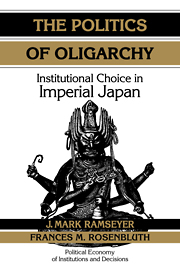Book contents
- Frontmatter
- Contents
- List of tables and figure
- Series editors' preface
- Acknowledgments
- CHAPTER 1 INTRODUCTION
- CHAPTER 2 THE COLLAPSE OF OLIGARCHY: FAILED ATTEMPTS AT CARTEL-MAINTENANCE
- CHAPTER 3 CONCESSION OR FACADE: THE MEIJI CONSTITUTION
- CHAPTER 4 ELECTORAL RULES AND PARTY COMPETITION: THE STRUGGLE FOR POLITICAL SURVIVAL
- CHAPTER 5 THE BUREAUCRACY: WHO RULED WHOM?
- CHAPTER 6 THE COURTS: WHO MONITORED WHOM?
- CHAPTER 7 THE MILITARY: MASTER OF ITS OWN FATE
- CHAPTER 8 FINANCIAL POLITICS
- CHAPTER 9 RAILROAD POLITICS
- CHAPTER 10 COTTON POLITICS
- CHAPTER 11 CONCLUSION: INSTITUTIONS AND POLITICAL CONTROL
- Notes
- References
- Index
CHAPTER 6 - THE COURTS: WHO MONITORED WHOM?
Published online by Cambridge University Press: 05 June 2012
- Frontmatter
- Contents
- List of tables and figure
- Series editors' preface
- Acknowledgments
- CHAPTER 1 INTRODUCTION
- CHAPTER 2 THE COLLAPSE OF OLIGARCHY: FAILED ATTEMPTS AT CARTEL-MAINTENANCE
- CHAPTER 3 CONCESSION OR FACADE: THE MEIJI CONSTITUTION
- CHAPTER 4 ELECTORAL RULES AND PARTY COMPETITION: THE STRUGGLE FOR POLITICAL SURVIVAL
- CHAPTER 5 THE BUREAUCRACY: WHO RULED WHOM?
- CHAPTER 6 THE COURTS: WHO MONITORED WHOM?
- CHAPTER 7 THE MILITARY: MASTER OF ITS OWN FATE
- CHAPTER 8 FINANCIAL POLITICS
- CHAPTER 9 RAILROAD POLITICS
- CHAPTER 10 COTTON POLITICS
- CHAPTER 11 CONCLUSION: INSTITUTIONS AND POLITICAL CONTROL
- Notes
- References
- Index
Summary
INTRODUCTION
On the independence of the imperial Japanese courts, most scholars turn a bit agnostic: The courts were sort of independent, they conclude, and sort of not. Political scientist Chalmers Johnson captures the mood. The Tsuda incident (described at Section 3.1) accomplished “the legitimation of judicial independence in Japan,” he writes (1972: 29). But “the judiciary still came under intense pressure to insure that the interests of the state … and the interests of justice were never incompatible” (id., 160).
Legal scholars show a similar ambivalence. Kenzo Takayanagi insists that turn-of-the-century judges “scrupulously guarded their independence” (1964: 10), but suggests that the “rule of law” never took hold before the war (id., 14). Hiroshi Oda (1993: 65–66) argues that “the independence of the court was guaranteed to a certain extent,” but concludes that “the Ministry of Justice was in charge of the overall administration of the courts.”
By contrast, on the probability of judicial independence in the abstract, most scholars are more positive. Some suggest, for example, that rational politicians will keep courts independent so that they can credibly promise contributors rent-extracting statutes (Landes and Posner, 1975). Others suggest politicians will keep courts independent so that they can use them to monitor their bureaucrats (McCubbins and Schwartz, 1984). Even to autocrats, some scholars champion judicial independence. Without independent courts, they explain, autocrats will be unable to make any promises they give credible.
- Type
- Chapter
- Information
- The Politics of OligarchyInstitutional Choice in Imperial Japan, pp. 74 - 89Publisher: Cambridge University PressPrint publication year: 1995



